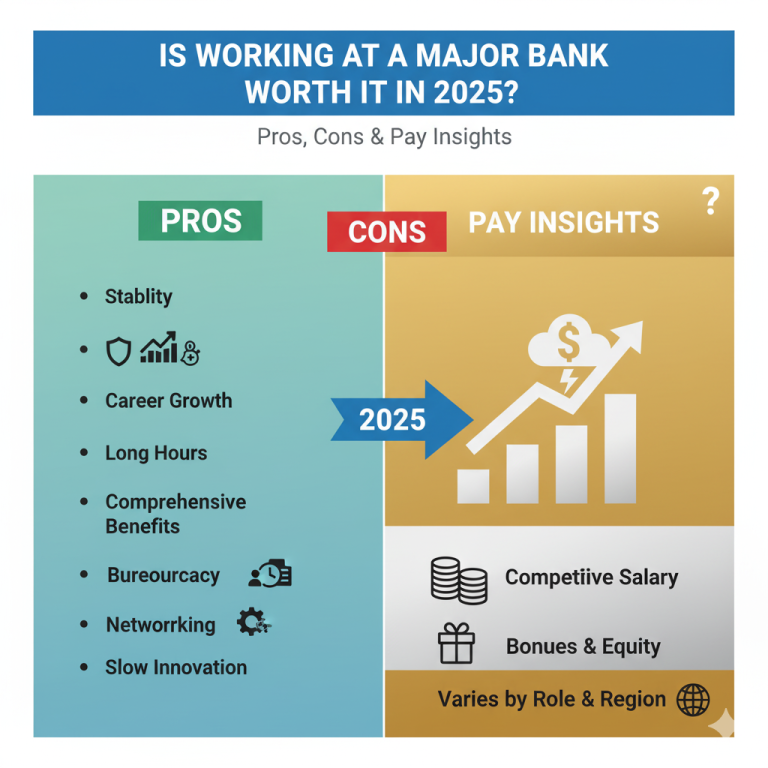Working at a major bank has long been considered a prestigious and lucrative career path. But in 2025, the finance industry is evolving rapidly — from fintech disruption to AI automation — and many professionals are asking: Is Working at a Major Bank Worth It in 2025?
In this guide, we’ll break down the pros and cons of a banking career, explore salary ranges, highlight top roles, and offer actionable tips for landing a job at a major bank. Whether you’re a recent graduate or a mid-career professional, this article will help you make an informed decision.
Download MonieVest’s 2025 Banking Career Salary Report to compare salaries across major banks.
What It’s Like to Work at a Major Bank in 2025
Major banks offer a variety of roles across corporate, retail, investment, and digital banking. Career progression can be rewarding but comes with challenges.
Career Paths in Major Banks
-
Retail Banking: Customer-facing roles like tellers, branch managers, and personal bankers.
-
Corporate & Investment Banking: Analyst, associate, VP, and director roles focused on finance strategy, M&A, or trading.
-
Operations & Risk Management: Ensures smooth back-office operations and compliance.
-
Fintech & Digital Banking: Increasing demand for tech-savvy employees in payments, blockchain, and AI solutions.
Internal Link: For a complete list of high-paying positions, check out 50 Best Paying Banking Jobs in 2025.
Pros of Working at a Major Bank
Working at a major bank offers several advantages:
Competitive Salary & Benefits
-
Base salaries are generally above the national average.
-
Benefits include health insurance, retirement plans, stock options, and bonuses.
-
Example: A mid-level analyst at J.P. Morgan may earn $85k–$120k, while senior associates can exceed $200k.
Training & Advancement Opportunities
-
Major banks invest in employee training programs and mentorship.
-
Clear career ladders allow employees to progress into senior management roles.
Job Stability & Networking
-
Large institutions tend to be stable employers with long-standing reputations.
-
Networking within the organization and industry opens doors for future opportunities.
Internal Link: Explore Ultimate Guide to Careers in Finance (2025 Edition) for more pathways in finance careers.
Cons of Working at a Major Bank
Despite the advantages, banking careers have drawbacks:
Long Hours & High Stress
-
Investment banking and corporate roles can require 60–80 hours per week.
-
Deadlines, high-stakes deals, and client pressure contribute to burnout.
Bureaucracy & Slow Innovation
-
Large institutions often have complex hierarchies, slowing decision-making.
-
Compared to fintech startups, banks may be slower to adopt new technologies.
Limited Creativity
-
Traditional banking roles may involve repetitive tasks or rigid procedures.
-
Employees seeking creative or entrepreneurial work may feel constrained.
Top Major Banks to Work For in 2025
While the “best” bank depends on your career goals, some consistently rank high for pay, culture, and advancement:
-
J.P. Morgan Chase – Strong global presence, competitive pay, and analyst programs.
-
Goldman Sachs – Prestigious brand, high salaries, but intense workload.
-
Bank of America – Offers career diversity and robust training programs.
-
Citi – Strong international exposure and opportunities in corporate banking.
-
Wells Fargo – Known for retail and commercial banking career paths.
Internal Link: Compare salaries in 50 Best Paying Banking Jobs in 2025 for a detailed breakdown.
How to Get a Job at a Major Bank
Landing a position at a major bank requires strategy and preparation:
Education & Skills
-
Degrees: Finance, Accounting, Economics, Business Administration, or Computer Science for fintech roles.
-
Skills: Excel, financial modeling, data analysis, communication, and problem-solving.
Internships & Networking
-
Summer internships are often the main path to full-time positions.
-
Leverage LinkedIn, alumni networks, and banking events to build connections.
Resume & Interview Tips
-
Highlight internships, certifications, and technical skills.
-
Prepare for case interviews, behavioral questions, and finance technical tests.
Start with Top 10 Online Courses to Start a Career in Finance (Free & Paid) to build the skills banks value most.
Alternatives to Major Banks
If a traditional bank isn’t the right fit, consider:
-
Fintech startups: Rapidly growing, innovative, and tech-driven.
-
Investment firms & private equity: Focused on high-value deals and strategy.
-
Credit unions & regional banks: Offer better work-life balance with similar banking exposure.
Internal Link: Discover digital banking tools in Top Fintech Tools for Personal Finance Management (2025).
Verdict: Is It Worth It?
Choosing a banking career in 2025 depends on your priorities:
Pros: Competitive pay, benefits, career growth, networking.
Cons: Long hours, bureaucracy, stress, and limited creativity.
Bottom line:
-
If stability, prestige, and high pay are your main goals, major banks are still a strong choice.
-
If innovation, flexibility, or entrepreneurship matters more, fintech or niche financial sectors may be a better fit.
CTA: Want detailed salary insights for all major banks? Download MonieVest’s 2025 Banking Career Salary Report today!
Final Thoughts
A career at a major bank is not one-size-fits-all. The right choice depends on your goals, lifestyle, and risk tolerance. By understanding the pros, cons, and opportunities, you can make a confident decision for 2025 and beyond.
Internal Link Suggestions:
-
[50 Best Paying Banking Jobs in 2025] – For specific roles and salaries.
-
[Ultimate Guide to Careers in Finance (2025 Edition)] – For broader career paths.
-
[How AI Is Changing the Future of Finance Jobs] – For tech-driven career planning.
MonieVest © 2025 — empowering your financial career journey.
